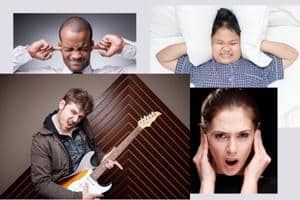
If you’re like me, you love to turn the volume on your Marshall amp to “11” and rip a guitar solo from Hell! But, it can be essential to ask yourself, is your neighbor upset with loud guitar playing? If the answer is yes, there are some simple things you can do to make things better for everyone.
Keep reading to learn all the tricks! If you’re in a hurry, click here to go directly to the quick checklist.
You can use the table of contents below to take you to the area that interests you. Click on the little box to open it, and then click on the section of the article you want to read, or you can read from start to finish if you want the complete solution!
The Short Answer
The best solution is to find a compromise that works for you and your neighbor. You can try various things, such as keeping your windows closed while you play, using headphones, or getting an amp with a master volume control.
It’s always best to talk with your neighbor to let them know you are sensitive to the problem and are willing to find a way to make it less annoying. This direct approach usually works best because it will help you get to the actual root of the problem and build a solution around that.
For example, it may be someone who sleeps during the day and works at night, so you can adjust your playing schedule to practice in the early evening.
Remedy Checklist
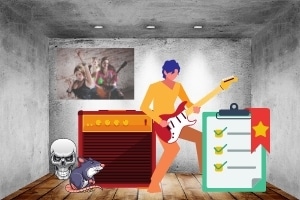
Here are some things to avoid upsetting your neighbor with loud guitar playing.
- Speak with your neighbor to get more information
- Soundproof your room
- Use a headphone amplifier or master volume control
- Change your playing time
- Find a different playing location
Keep On Reading Below To Learn More About Each Topic
So, How Loud Is Too Loud?
Although loud is a relative term, normal conversion is around 50 to 60 decibels (dB), an average Rock concert is about 120 dB, and above that begins the human threshold of pain.
Don’t assume that what’s ok for you is not too loud for your neighbor, especially if you have hearing loss from noise exposure!
How To Make A Bad Situation Better
A loud noise annoyance has the potential to escalate very quickly, even if it’s music. If your neighbor lets you know that your guitar playing or band is too loud, the best thing to do is to make it clear that you want to work to find a solution that works for all parties involved.
I’ve often been in this situation with garage bands and playing in apartment buildings. Getting into confrontations or spiteful displays of sound volume isn’t the answer and is sure to make everything worse very quickly or in the long run!
A long time ago, I received a nasty note in my mailbox from a tenant living below me about the volume of my music. I spoke with the man and found out his wife was sick with cancer! The point is, even if you think your sound volume is reasonable, you never know what others are dealing with, so get the facts and be considerate!
Electric Bass Guitars Can Be The Worst!
If you play the electric bass, be aware that this instrument has the potential to cause the most significant guitar noise disturbance, even if your neighbor lives across the street or down the road!
The problem is that the frequency range of the lower notes on a bass guitar contains some pretty long wavelengths that tend to travel the farthest and easily penetrate structures like walls and windows.
For example, when you’re approaching a concert hall to see a rock or metal show already in progress, the first thing you hear outside the building is the bass guitar!
Acoustic Guitars Can Create Noise Problems Too!
You don’t have to play an electric guitar to create a noise problem. Neighbors can perceive acoustic guitars as too loud, especially if you live in an apartment building.
Playing an acoustic guitar with a pick, strumming aggressively, and having more than one acoustic guitar being played at once all have the potential to create a noise disturbance.
The larger the body of your acoustic guitar is, the more sound it can project. Smaller (“parlor”) guitars are your best bet when it comes to controlling noise.
Can You Play An Electric Guitar Unplugged?
This is a question I’m often asked by beginning players or parents who are thinking of buying their child an electric guitar. The answer is, you certainly can, but who would want to? Isn’t that the whole point of getting an electric guitar so that you can plug it into an amplifier?
When I bought my first electric guitar at Sears in the 1960s, I bought a cheaper model to have money left over to buy an amp.
However, it can be good to practice without pugging in if you are trying to focus on perfecting a musical piece or a tricky solo. This can remove the distraction of adjusting amplifier dials or playing around with effects pedals.
The other advantage of playing unplugged is that it is convenient. I keep multiple electric guitars all over the house on stands so that wherever I have a few minutes, I can grab one and play it unplugged. Every few minutes of practice adds up and makes a difference in the long run!
Related Article ➡ Can You Play An Electric Guitar Unplugged? – Ultimate Guide!
Tips To Sound Softer
Apart from turning the volume of your amplifier lower, there are several things you can do to keep your music from annoying or waking up your neighbor.
Close All Windows And Doors
Open windows and doors can make a big difference in how far the sound carries, especially if neighbors live nearby!
If it becomes too hot in the room and you don’t have air conditioning, have a few floor fans on hand to use while you play. They won’t actually cool down the room, but they create a draft that helps your body dissipate heat to make you more comfortable while you play.
Change Rooms
Try to select a location in the house that’s farthest away from the neighbor who is being annoyed by your playing. Basement locations can be a good choice since they typically have no (or small-size) windows and the cement foundation helps absorb sound.
Soundproof The Room
Acoustic foam panels work great and can be attached to doors and walls.
Bass traps are essential since low-frequency sounds with longer wavelengths tend to travel the longest distance.
Rubber mats can be purchased as interlocking squares to help soundproof the floor. You can place a rug over the squares for additional sound absorption.
Large upholstered chairs and couches can also help trap sound.
Pull down any shades or close the blinds or curtains on windows to help absorb sound.
Playing An Electric Guitar With Headphones
Another solution is to play your guitar through an amp with a headphone jack. You have two good options if your guitar amp doesn’t already have a headphone jack.
1. Get yourself a cheap practice amp designed to be used with headphones.
I love the sound of the Blackstar Fly 3 amp! It has a stereo output jack for a “speaker cabinet” emulated output to an MP3 recorder or a digital recording studio. It can also be used as a headphone jack.
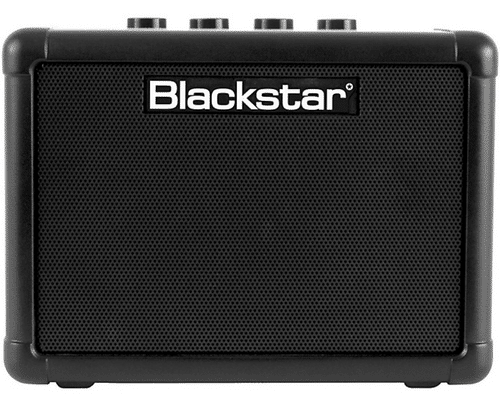
To read my full review, see Blackstar Fly 3 Review – You won’t really believe your ears!
2. The other option is to get a headphone amp that plugs directly into your guitar.
I have the VOX AP2AC amPlug AC30 Guitar Headphone Amplifier, and I use it all the time. It really rocks that Class A British sound and sounds amazingly good compared to my real all-tube Vox AC-30 amplifier!
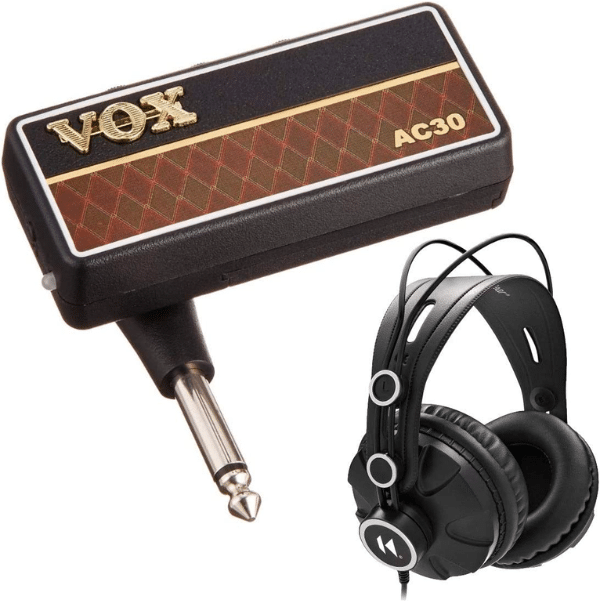
Choosing The Right Amplifier
If you play loud to get more sustain, overdrive, or distortion, having the right amplifier can help you keep the volume lower.
There are two ways you can go to help address the problem.
Low Wattage Amps
A low-wattage amp will help you turn up the volume without getting too loud. If you practice with a band, look for an amp with a 5 to 20 Watt RMS power output. If you practice alone, you can use something even smaller, like the Blackstar Fly 3 pictured above.
Amps With A Master Volume Control
If you have a more powerful amplifier with a master volume control, you can turn the volume control up as high as you need to get your sound and adjust the master volume lower to control the overall volume coming from the speakers.
Remember when the Marshall JCM 800 Head came out in the 1980s? It was a game-changer because it allowed players to get that great Marshall sound without breaking windows! The amp helped give rise to some of the greatest “big hair and spandex” Metal bands of that decade.
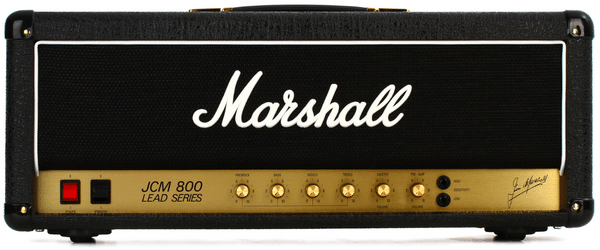
Advantages Of Addressing The Noise Problem
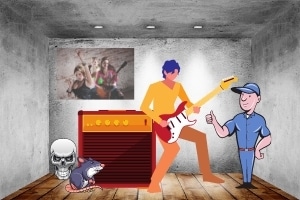
If you keep your noise level under control, your neighbors will most likely return the favor.
It’s best to have a positive relationship with all your neighbors. It makes day-to-day life so much better! They can be helpful in many situations, like having them watch your home while you’re away and helping you with home improvement projects.
Growing up, we lived in a nice neighborhood, and I learned the value of working cooperatively with the people next door. It felt good to help them, and they helped us in return!
Disadvantages Of Ignoring The Situation

It’s always best to address any noise complaints from neighbors as soon as possible. The longer you wait, the more difficult it can become for you to solve the problem.
Angry neighbors can really make your life miserable by calling the police to report a noise disturbance or doing spiteful things to get back at you.
I have seen neighbors have ongoing “feuds” with each other, leaving bright lights on all night that point toward their neighbor’s bedroom window or putting trash like old cars and furniture along a shared property line.
Once you go down this path, it’s usually very difficult, if not impossible, to rectify the situation. You don’t want to get into a costly legal battle over a lawsuit!
Beware Of Legal Actions And Repercussions!
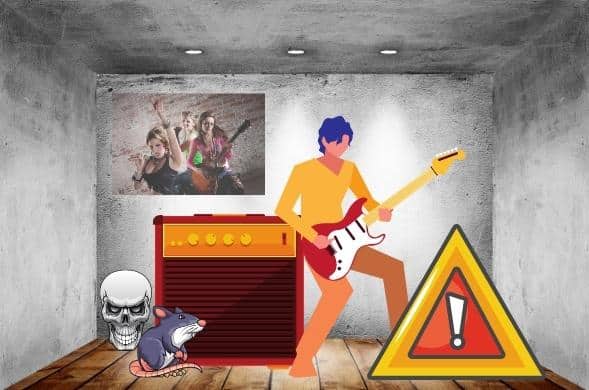
If you play loud guitar, be aware that some states, cities, and towns have laws and ordinances regarding noise nuisances. Often, there can be severe fines and penalties.
Be sure to call or check online to see what regulations apply in the area you live so that you have a clear idea of what you might be up against.
Frequently Asked Questions
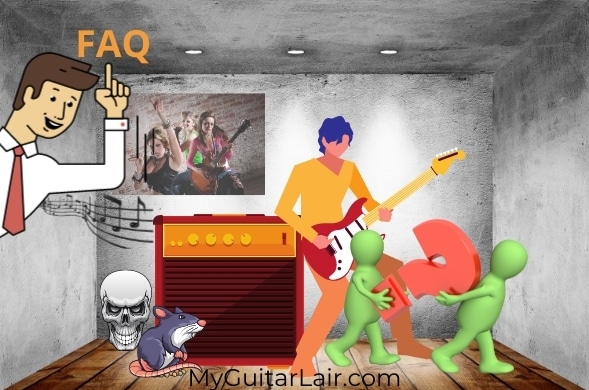
Here are some of the questions I get asked about loud guitar playing.
If your question does not appear here, please put it in the comments, and I will get right back to you with an answer.
Can Neighbors Hear Your Unplugged Electric Guitar?
Yes, it is possible. If you are playing a hollowbody or semi-hollowbody electric guitar, a neighbor that shares a common wall in your apartment building could hear you playing, especially if you use a guitar pick.
It’s very unlikely that you will disturb a neighbor if you play a solid body electric guitar unplugged since it makes very little sound.
Is Acoustic Guitar Too Loud For Neighbors?
Your acoustic guitar playing could upset a neighbor that shares a common wall. To rectify the situation learn to strum softly or fingerpick the strings instead of using a guitar pick.
Can A Guitar Be Heard Through Walls?
Absolutely! The sound of a guitar (electric and acoustic) can penetrate through walls, especially if they are thin or poorly insulated.
How Loud Is Too Loud For An Apartment?
The answer can depend on many factors, such as building construction and the average age of your neighbors. Generally speaking, if your playing is louder than someone speaking in a loud voice (60 Decibels or higher), you may be on the threshold of creating a noise disturbance.
How Do You Strum Quietly?
You can strum a guitar quietly by learning to control your guitar pick or using your fingers to pluck the strings. The fingerpicking method works best. To avoid disturbing his wife, the great Wes Montgomery developed his unique sound by strumming and picking the strings with his thumb.
A nylon-string guitar is the easiest to strum quietly, especially without a pick.
How do you muffle a guitar?
If you have an acoustic, hollowbody, or semi-hollowbody electric guitar, you can muffle it by putting rags inside the body. However, I don’t recommend this. It can dramatically lower the quality of your instrument’s tone.
Final Thoughts

You can do several things to avoid upsetting your neighbor with your loud guitar playing.
Always begin by speaking with your neighbor to find out the nature of the problem, whenever possible. It might be something as simple as synchronizing your schedules. Perhaps someone works at night and sleeps during the day!
Play with your windows and doors closed, and select a room farthest from your neighbor. Soundproofing your room is a great option and can be done without spending a lot of money.
When using a guitar amplifier, use headphones or an amp with a master volume control.
If you practice with a band, consider choosing a different playing location.
Be proactive to avoid upsetting people, potentially spiteful actions, a lawsuit, and a costly legal battle with your neighbor!

What To Read Next ➡ Electric Guitar Amp Settings For Rock: The Insider’s Guide!
Tell Me What You Think
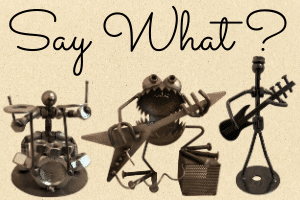
Please leave a comment below if you enjoyed this article, have any questions about loud guitar playing, or want to give your point of view. I will be happy to help you.
- Have you ever had a problem with a noise disturbance involving a neighbor? How did you deal with it?
- What amplifier do you like best for getting your sound without playing excessively loud?
- After reading this article, did it give you the information you need to address your problem?
- What else is on your mind?



I really loved this article because it related to me so well I must say, I am definitely going to get this so I can play my guitar with the headset. This is a really nice product. Thank you so much for sharing this amazing product on here. I really appreciate this. I can finally play my instrument well.
Hi, and Thank You for your comments!
The Blackstar Fly 3 is a great little amp! It really rocks and is much louder than you might think. It has a headphone jack and a master volume control, so you can’t go wrong!
Enjoy the amp!
Frank
Hi Frank, playing guitar is is one of my main loves in my life, It helps me relax I play acoustic guitar and have been playing guitar since 1972 , I use to play in Church and youth groups in the 70s -80s here in Australia. Music is important in life. I like your subject, I can relate to it, Over the years I have turned into a closet player, don’t play any more in public. Any sounds from my guitar is to loud to my wife who shuts all the doors between us as soon as she hears me.
Your site to me is set out well with your sidebar access to other subjects and with some fun diagrams which helps to break the ice. Great subject matter.
Hi, Chaz
I really appreciate your comments!
Playing the guitar is one of the best things you can do to relax and have fun! Music is undoubtedly essential in life!
I played guitar in church for a few years, right around the time you started playing in 1972. It was a great experience!
Thanks for your compliments on my website!
Keep playing as much guitar as you can, and come back soon!
Frank 🎸